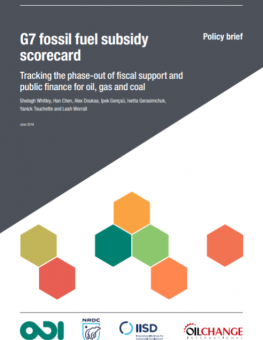
G7 Fossil Fuel Subsidy Scorecard: Tracking the phase-out of fiscal support and public finance for oil, gas and coal
While progress is being made to transition away from fossil fuels, this analysis shows that G7 governments continue to provide at least USD 100 billion in subsidies and public finance to the production and use of coal, oil and gas that may hinder or delay these shifts.
G7 countries (and others around the world) are in the early stages of an energy transition—including, in some areas, a shift away from the production and consumption of fossil fuels.
This transition is being driven by decarbonization objectives and policies, as well as a sharp reduction in the cost of clean technologies. In acknowledgement of this, every year since 2009 the G7 and G20 have committed to phase out fossil fuel subsidies, in line with related commitments under the Sustainable Development Goals and the Paris Agreement.
While progress is being made to transition away from fossil fuels, this analysis shows that G7 governments continue to provide at least USD 100 billion in subsidies and public finance to the production and use of coal, oil and gas that may hinder or delay these shifts. Despite their numerous commitments, not only have G7 governments taken limited action to address fossil fuel subsidies, but they have also failed to put in place any mechanisms to define and document the full extent of their support to oil, gas and coal, or to hold themselves accountable for achieving these pledges. The G7 fossil fuel subsidy scorecard aims to address this accountability gap and track, for the first time, each G7 country’s progress in phasing out fossil fuel subsidies across seven indicators.
The authors find that, with less than seven years to meet their 2025 phase-out deadline, G7 governments continue to provide substantial support to the production and use of oil, gas and coal. On average per year in 2015 and 2016 the G7 governments gave at least USD 81 billion in fiscal support and USD 20 billion in public finance, for both production and consumption of oil, gas and coal at home and overseas.
Participating experts
Funded by
You might also be interested in
Five Key Priorities to End Fossil Fuel Subsidies in Canada
As the G7 president in 2025, Canada has a pivotal opportunity to lead by fully phasing out fossil fuel supports and investing in a cleaner, more equitable future. Here are five recommendations for effective subsidy reform.
The Cost of Fossil Fuel Reliance
Government support for fossil fuels reached at least USD 1.5 trillion in 2023, new data shows.
Increased Support Needed to Achieve India's Clean Energy Goals
India is on track to achieve many of its 2030 clean energy goals but needs to step up government support measures to accelerate the deployment of offshore wind, electric vehicles, and green hydrogen, according to a new report.
Ending Export Credits for Oil and Gas: How OECD countries can end 2024 with a climate win
For a year now, Organisation of Petroleum Exporting Countries (OECD) governments have been negotiating an agreement that could put an end to oil and gas export finance. Following the acrimony in Baku, this would be a very real way for the OECD to show policy coherence, respond to calls from the poorest countries to stop subsidizing fossil fuels, and shift public finance to solutions.